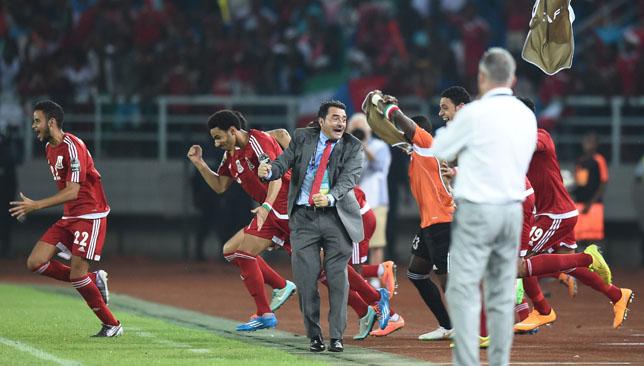
BATA, Equatorial Guinea – Esteban Becker was drenched in sweat as he walked through the mixed zone towards Equatorial Guinea’s team bus, and clearly exhausted too. The conditions are crushingly humid here but the Argentine had another reason to be completely spent: he had just led the host nation to a remarkable qualification for the quarter-finals and the Estadio de Bata was still reverberating to the celebrations of 37,000 joyous locals.
– #360debate: Will Omar Abdulrahman leave the AGL?
Equatorial Guinea qualified for the last eight in 2012, too, when they co-hosted the tournament with Gabon. But this particular achievement needs putting into context. Becker, formerly in charge of the country’s successful women’s team, was only appointed to the role a month ago and had two weeks to work with his hastily-assembled squad before the tournament began. The country had, of course, not expected to compete in this Africa Cup of Nations and among the 23 that Becker selected were several players who had never met before – and a number playing for amateur clubs or sides in the obscure local league.
Yet he has created a team that seems happy in its own skin, and one that has a style very different to that of their opponents. Fourteen of the squad were born in Spain and have at least one Equatoguinean parent; seven of them play there, generally for third-tier sides or the reserve selections of clubs such as Valencia and Mallorca. Middlesbrough’s Emilio Nsue and ex-Real Madrid man Javier Balboa provide seniority and inspiration. Although it should be nothing out of the ordinary, the team has a synthesis of Iberian composure and African strength that nobody has – as yet – had an answer to. At half-time in Sunday night’s decisive 2-0 win over Gabon you would have still backed their more experienced opponents, but the Equatoguineans – roared on amid a truly special atmosphere – stepped up a gear and won with a controversial Balboa penalty and a tap-in from the substitute, Iban.
They will now play a quarter-final in tiny Ebibeyin, the hometown of Nsue’s father and a far cry from vibrant Bata. That means another hike out east for the press pack, whose patience was sometimes tested during a generally dour series of second matchdays.
A prime example was the match between Algeria and Ghana in Mongomo. Asamoah Gyan’s last-minute winner should have been a moment to make the hair stand up on end, but instead it led to the row of British journalists looking at each other with different degrees of despair. The goal was superbly taken, and all the more a good news story because he had missed the Black Stars’ opening game with a bout of malaria and was clearly running on empty during this one – but anyone sitting opposite would have noticed a collective shaking of the head. If any game deserved a goal, it was not this one.
Much of the action in that second set of games was hard going as teams sought to protect what they had already won or took care not to see their chances slip completely away. Not that it bothered all of those watching in areas reserved for the media. You never quite know what to expect when you sit down in a press box at this tournament: during the Zambia v DR Congo game in Ebibeyin this correspondent was briefly joined by a mother and her very young baby, while both games involving Ghana and the Algerians in Mongomo have seen highly partisan press contingencies from the respective countries launch into full celebration mode when their teams scored. There was wild jubilation among the west Africans when Gyan’s goal went in; it did, at least, postpone any “Avram Grant has destroyed Ghana” headlines and kept Group C as wide open as any of the others.

On Monday evening, Yannick Bolasie and Democratic Republic of the Congo play Tunisia in a decisive Group B fixture. Crowds for this tournament have been outstanding, and in excellent voice, thus far but it seems a stretch to expect thousands to turn up at the scene of last night’s Equatorial Guinea heroics for this one. Bolasie is one of the few Premier League players to have made a real impact in this competition, scoring a superb equaliser against Zambia, and will be needed against the Tunisians. In a tournament where nobody has really jumped out as a potential winner to date, the unflashy north African side looks an outside bet to make quiet progress all the way to the very end.
Whatever happens, the hosts’ progress means that the level of interest in this competition should live to fight at least another five days or so. What we now need to retain is a degree of stardust – with the likes of Ivory Coast, Cameroon and Algeria all teetering on the brink. With two weeks still to go, this tournament needs to keep as much of it as possible – and we journalists should treasure it whenever, and however, it shows itself.